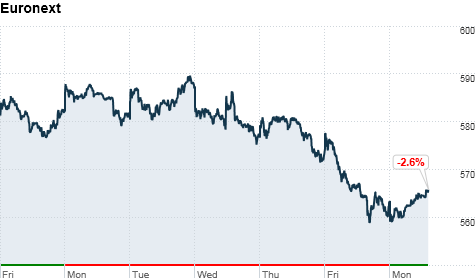World markets under pressure
@CNNMoneyInvest June 4, 2012
NEW YORK (CNNMoney) -- European stocks were mixed Monday, while Asian stocks sold off in reaction to last Friday's U.S. jobs report that was released after Asian markets had closed.
Investors continue to cast a wary eye on Europe, where problems with Spain's banking system have dominated sentiment, along with the back-and-forth debate about whether Greece will leave the eurozone.
Aside from Spain, concerns about smaller troubled sovereigns, like Portugal, have just added fuel to the fire. Earlier this year, Standard & Poor's cut Portugal's credit raiting to junk status, raising concern about that nation needing a bailout.
While Portugal is a smaller economy, than Spain or Greece, the concern of contagion spreading is a constant cause of investor fear. Some of that fear was eased early Monday, when Portugal's Minister of Finance said it would inject €6.6 billion of capital into that nation's largest banks.
And inflation figures were also less terrible. Early Monday, Eurostat, the statistical office of the European Union, said the euro area's price producer index in April was flat compared to the prior month, when it notched up by 0.5%.
The CAC 40 (CAC40) in Paris rose 0.5% and the DAX (DAX) in Frankfurt fell 0.7%. The FTSE (UKX) in London was closed Monday for the spring bank holiday.
Much of the market volatility is a hangover from last week that included a disappointing U.S. jobs report and a report showing eurozone unemployment hit a record high of 11%.
"Last week, expectations for the global economic outlook turned markedly to the dark side," said High Frequency Economics chief economist Carl Weinberg, in a research note.
Also, billionaire investor George Soros painted a bleak picture of the world economy, and the future of the eurozone in particular, in a speech at the Festival in Economics in Trento, Italy, on Friday.
He said there's no simple solution to Europe's fiscal crisis, which is especially obvious when considering the disparity between strong, stable countries like Germany and weak, unstable countries like Greece.
"So the crisis is getting even deeper," said Soros, who criticized the austerity policy for squashing growth. "Tensions in financial markets have risen to new highs as shown by the historic low yields in Bunds. Even more telling is the fact that the yield on British 10 year bonds has never been lower in its 30 year history while the risk premium on Spanish bonds is at a new high."
The yield for Germany's 10-year bond yield was at 1.2% on Monday, compared to 30% for Greece. The United Kingdom's 10-year bond yield was at 1.53%, compared to 6.47% for Spain.
Why China can't let Europe slip
Asian markets sold off Monday, in reaction to last week's soft manufacturing report from China and Friday's U.S. job report. The Nikkei (N225) in Tokyo closed down 1.7% on Monday, while China's Shanghai Composite (SHCOMP) slid 2.7%, and the Hang Seng (HSI) in Hong Kong closed down 2%.
Meanwhile, U.S. stocks were mostly lower in early trading on Wall Street. TheDow Jones industrial average (INDU) was down about 30 points, while the S&P (SPX) fell 3 points. The Nasdaq (COMP) held modest gains.
© 2012 Cable News Network. A Time Warner Company. All Rights Reserved. money.cnn.com